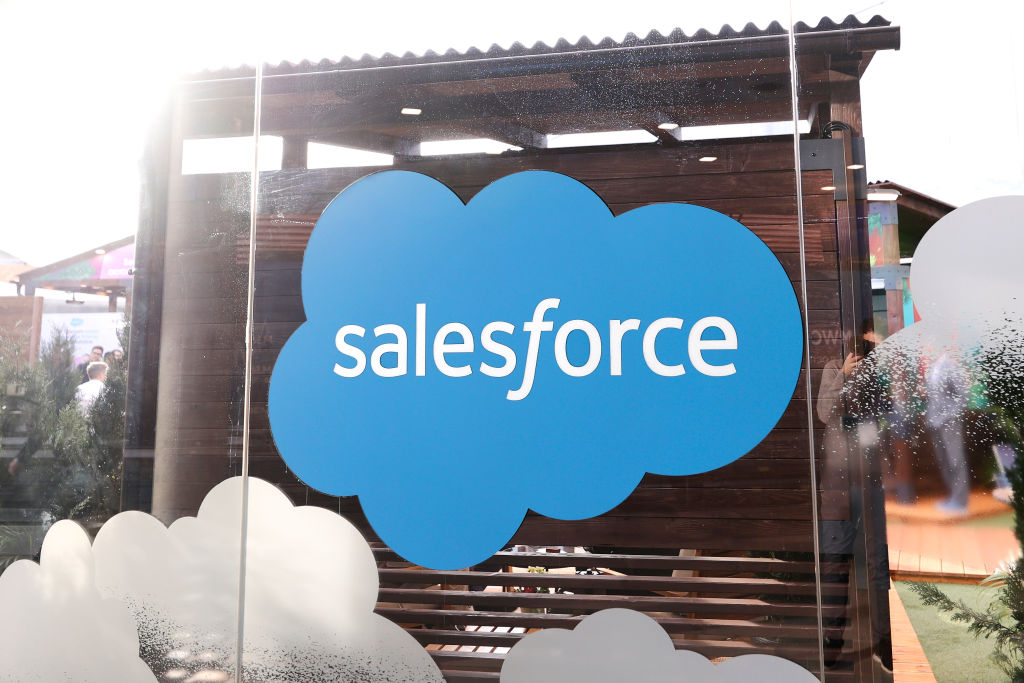Salesforce Reports Earnings Beat, CFO Exit: What to Know
Salesforce stock is struggling for direction Thursday after the tech giant disclosed Q2 earnings and a key C-suite shake up.


Profit and prosper with the best of Kiplinger's advice on investing, taxes, retirement, personal finance and much more. Delivered daily. Enter your email in the box and click Sign Me Up.
You are now subscribed
Your newsletter sign-up was successful
Want to add more newsletters?
Salesforce (CRM) stock is choppy Thursday as Wall Street parses the software-as-a-service firm's (Saas) second-quarter earnings beat and upwardly revised full-year profit forecast.
In the three months ended July 31, Saleforce's revenue increased 8.4% year-over-year to $9.3 billion. Its earnings per share (EPS) were up 20.8% from the year-ago period to $2.56.
"In Q2, we delivered strong performance across revenue, cash flow, margin and cRPO [current remaining performance obligation, a measure of revenue], and raised our fiscal year non-GAAP operating margin and cash flow growth guidance," said Salesforce CEO Marc Benioff in a statement.
From just $107.88 $24.99 for Kiplinger Personal Finance
Become a smarter, better informed investor. Subscribe from just $107.88 $24.99, plus get up to 4 Special Issues

Sign up for Kiplinger’s Free Newsletters
Profit and prosper with the best of expert advice on investing, taxes, retirement, personal finance and more - straight to your e-mail.
Profit and prosper with the best of expert advice - straight to your e-mail.
Benioff added that the company's new AgentForce artificial intelligence (AI) platform is "reimagining enterprise software for a new world where humans with autonomous Agents drive customer success together. Salesforce is the only company with the leading apps, trusted data and agent-first platform to deliver this vision at scale and help companies realize the incredible benefits of AI."
The company's top- and bottom-line results beat analysts' expectations. Wall Street was anticipating revenue of $9.2 billion and earnings of $2.36 per share, according to CNBC.
As a result of its strong performance in the first half of the year, Salesforce raised its profit forecast for its full fiscal year. The company now anticipates earnings per share in the range of $10.03 to $10.11, up from its previous forecast of $9.86 to $9.94. It added that it continues to expect revenue to arrive between $37.7 billion to $38 billion.
For the third quarter, Salesforce is guiding for revenue in the range of $9.31 billion to $9.36 billion and EPS in the range of $2.42 to $2.44. This is mixed compared to analysts' expectations for revenue of $9.41 billion and earnings of $2.43 per share.
The report also included news that Amy Weaver will be leaving her position as chief financial officer of Salesforce.
Is Salesforce stock a buy, sell or hold?
Salesforce has been one of the worst Dow Jones stocks this year, off a little over 1% at last check. Still, Wall Street is bullish on CRM.
According to S&P Global Market Intelligence, the average analyst target price for CRM stock is $308.22, representing implied upside of roughly 19% to current levels. Meanwhile, the consensus recommendation is a Buy.
Financial services firm Needham is one of the more bullish outfits on the blue chip stock with a Buy rating and $345 price target.
"CRM reported modest, but largely in line, Q2 results," says Needham analyst Scott Berg. "While sales appear steady, the negative news was CFO Amy Weaver's resignation who was well-liked by the Street given her successful push for operating leverage. The call's highlight was details given for its new AgentForce bot technology CRM believes can drive incremental sales in Sales and Service Clouds."
Related Content
Profit and prosper with the best of Kiplinger's advice on investing, taxes, retirement, personal finance and much more. Delivered daily. Enter your email in the box and click Sign Me Up.

Joey Solitro is a freelance financial journalist at Kiplinger with more than a decade of experience. A longtime equity analyst, Joey has covered a range of industries for media outlets including The Motley Fool, Seeking Alpha, Market Realist, and TipRanks. Joey holds a bachelor's degree in business administration.
-
 What Really Happens in the First 30 Days After Someone Dies
What Really Happens in the First 30 Days After Someone DiesThe administrative requirements following a death move quickly. This is how to ensure your loved ones won't be plunged into chaos during a time of distress.
-
 AI-Powered Investing in 2026: How Algorithms Will Shape Your Portfolio
AI-Powered Investing in 2026: How Algorithms Will Shape Your PortfolioAI is becoming a standard investing tool, as it helps cut through the noise, personalize portfolios and manage risk. That said, human oversight remains essential. Here's how it all works.
-
 Why Some Michigan Tax Refunds Are Taking Longer Than Usual This Year
Why Some Michigan Tax Refunds Are Taking Longer Than Usual This YearState Taxes If your Michigan tax refund hasn’t arrived, you’re not alone. Here’s what "pending manual review" means and how to verify your identity if needed.
-
 What Really Happens in the First 30 Days After Someone Dies (and Where Families Get Stuck)
What Really Happens in the First 30 Days After Someone Dies (and Where Families Get Stuck)The administrative requirements following a death move quickly. This is how to ensure your loved ones won't be plunged into chaos during a time of distress.
-
 AI-Powered Investing in 2026: How Algorithms Will Shape Your Portfolio
AI-Powered Investing in 2026: How Algorithms Will Shape Your PortfolioAI is becoming a standard investing tool, as it helps cut through the noise, personalize portfolios and manage risk. That said, human oversight remains essential. Here's how it all works.
-
 If You'd Put $1,000 Into Caterpillar Stock 20 Years Ago, Here's What You'd Have Today
If You'd Put $1,000 Into Caterpillar Stock 20 Years Ago, Here's What You'd Have TodayCaterpillar stock has been a remarkably resilient market beater for a very long time.
-
 Good Stock Picking Gives This Primecap Odyssey Fund a Lift
Good Stock Picking Gives This Primecap Odyssey Fund a LiftOutsize exposure to an outperforming tech stock and a pair of drugmakers have boosted recent returns for the Primecap Odyssey Growth Fund.
-
 More Tools to Build a Bond Ladder
More Tools to Build a Bond LadderVanguard aims to launch a line of target-maturity corporate bond ETFs.
-
 A Newly Retired Couple With a Portfolio Full of Winners Faced a $50,000 Tax Bill: This Is the Strategy That Helped Save Them
A Newly Retired Couple With a Portfolio Full of Winners Faced a $50,000 Tax Bill: This Is the Strategy That Helped Save ThemLarge unrealized capital gains can create a serious tax headache for retirees with a successful portfolio. A tax-aware long-short strategy can help.
-
 5 Retirement Myths to Leave Behind (and How to Start Planning for the Reality)
5 Retirement Myths to Leave Behind (and How to Start Planning for the Reality)Separating facts from fiction is an important first step toward building a retirement plan that's grounded in reality and not based on incorrect assumptions.
-
 I'm a Financial Adviser: Silence Is Golden, But It Hurts Your Heirs More Than You Think
I'm a Financial Adviser: Silence Is Golden, But It Hurts Your Heirs More Than You ThinkTalking to heirs about transferring wealth can be overwhelming, but avoiding it now can lead to conflict later. Here's how to start sharing your plans.